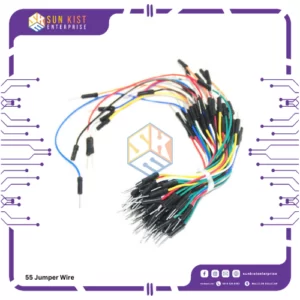Description
The NodeMCU ESP8266 V3 CH340G is a popular development board that combines the ESP8266 WiFi module with a USB-to-Serial converter chip (CH340G). This board is widely used by electronics enthusiasts, makers, and developers for creating Internet of Things (IoT) projects and applications that require wireless connectivity and microcontroller capabilities.
Key Features:
ESP8266 Module: The NodeMCU ESP8266 V3 is built around the ESP8266 WiFi module, which is a versatile and cost-effective solution for adding WiFi connectivity to projects.
Microcontroller: The board features a powerful microcontroller based on the ESP8266, which allows for programming and control of digital and analog I/O pins.
Integrated USB-to-Serial: The CH340G chip on the board provides USB-to-Serial conversion, allowing easy programming and communication with a computer.
Built-in WiFi: The ESP8266 module provides built-in support for WiFi connectivity, enabling IoT applications and communication with other devices and the internet.
GPIO Pins: The board includes a set of General-Purpose Input/Output (GPIO) pins, which can be used for interfacing with various sensors, actuators, and external components.
Programming: It can be programmed using the Arduino IDE or other development environments, making it accessible to a wide range of developers.
Lua Scripting: The NodeMCU firmware supports Lua scripting, providing a convenient way to develop IoT applications.
NodeMCU Firmware: The NodeMCU firmware simplifies programming and offers a higher-level API for working with the ESP8266 module.
Power Supply: The board can be powered via USB or an external power source, making it suitable for a variety of power scenarios.
Applications:
IoT Prototyping: The NodeMCU ESP8266 V3 is often used for prototyping and developing IoT applications, including smart home devices, environmental monitoring, and remote control systems.
Wireless Communication: It is used for projects that require wireless communication, such as data transmission and control through WiFi networks.
Sensor Interfaces: The board’s GPIO pins can be used to interface with various sensors, allowing it to collect data from the physical environment.
Home Automation: It is employed in DIY home automation projects to control lights, appliances, and other devices remotely.
Education: The NodeMCU board is used in educational settings to teach IoT and wireless communication concepts.
Rapid Development: Makers and developers use the NodeMCU for rapid development of wireless-enabled applications and prototypes.
Web Servers: It can be used to create web servers, enabling control and monitoring through web interfaces.
The NodeMCU ESP8266 V3 CH340G is a versatile and accessible platform for developing WiFi-enabled projects and IoT applications. Its integration of the ESP8266 module, microcontroller, and USB-to-Serial converter simplifies development, making it a popular choice among hobbyists, students, and professionals working in the IoT and electronics fields.











Reviews
There are no reviews yet.